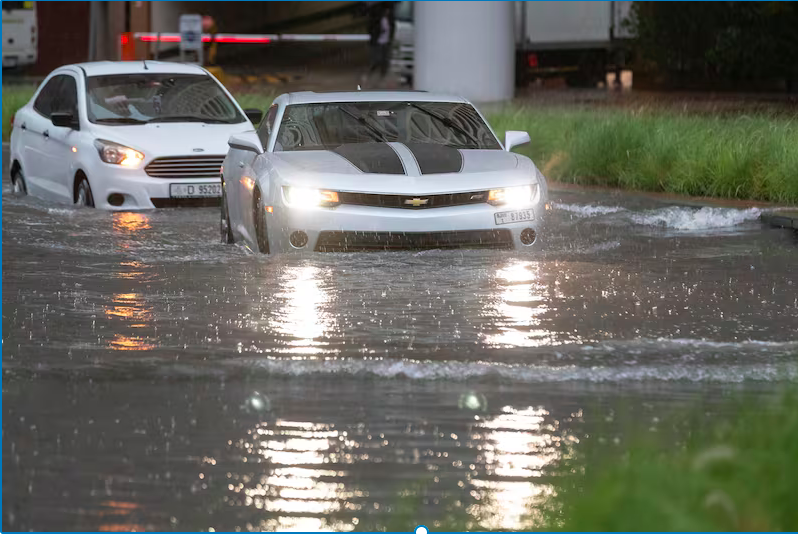Public relations professional Jonty Summers’ Land Rover was parked on the street in Dubai’s Umm Suqeim area during the record rain in the UAE last week.
The car was almost submerged, with rain water reaching the windows.
It took Mr Summers two days before he could talk to his insurance company as it was dealing with a high volume of calls.
“I raised a claim and it is being processed. It was easy to get the police certificate. It only takes a minute to get it on the Dubai Police app,” he says.
However, Mr Summers, who has a comprehensive motor insurance policy, is still waiting for his car to be towed to a garage as the street was only drained of water on Monday.
“I am now waiting for the scope of damage to be assessed,” he adds.
On April 16, the UAE experienced its heaviest rainfall since records began in 1949.
Homes and roads were flooded, while partly submerged cars were abandoned on motorways and flights were cancelled, delayed or diverted.
On Monday, the UAE Central Bank confirmed that damage to vehicles and homes due to the rain would be covered if there is a comprehensive insurance policy against loss and damage.
It also issued a notice to all banks and financial services companies asking them to allow a six-month deferment of repayments for personal and car loans for customers affected by the record-breaking storms.
Customers will not incur any additional fees, interest or profit charges, or an increase in the principal amount of the loan, the regulator said.
What are the best car insurance policies?
Comprehensive car insurance acts as a financial shield against a wide range of perils.
Always ensure you have the right type of policy for your car, as this will help you safeguard against any financial losses, says Toshita Chauhan, business head of health and motor insurance at insurance aggregator Policybazaar.
Third-party liability insurance, which is the minimum legal requirement, protects others on the road if you cause an accident, she says. However, it falls short when it comes to your own vehicle.
“Imagine this scenario – you park your car during a sudden downpour, only to return and find it submerged in floodwater. The engine sputters, the interior is a soggy mess and the electrical system is fried,” Ms Chauhan says.
“In this situation, a third-party liability policy leaves you solely responsible for the repair costs, which can run into thousands of dollars.”
With the frequency of weather-related incidents increasing, Suresh Nair, executive director at Gargash Insurance, recommends customers opt for the best cover and ask the insurance broker specific questions to make sure such eventualities are covered.
Claims on the rise
The number of motor insurance claims are currently higher than normal, says Mr Nair.
As claims are still coming in, insurance companies are expecting the numbers to remain high for the next four or five days and will not know the exact numbers until the end of this week, he says.
In the first few days after the rains, Sharia-compliant insurance company Watania Takaful registered an increase in the number of calls and inquiries relating to motor and property claims that was three times higher than average, according to chief executive Gautam Datta.
The company expects more inquiries to come in the following days, Mr Datta adds.
“If it’s a third-party only coverage, then the insurance company does not pick up rain-caused damages. If it’s a comprehensive cover, there are some policies which provide natural perils coverage,” Mr Nair says.
“Insurance companies are looking at situations where the insured has tried to avoid damages by paying heed to authority warnings to not take the car out and park it in a normal place. In such cases, most policies would look at paying for the damages.”
However, there is no consensus in terms of covering vehicles that were taken out on the road and driven during the rain despite warnings, he adds.
Natural catastrophes like earthquake and flood-related damages are excluded from unified motor policies, Mr Datta says.
Delay in car repairs
The general turnaround time for car repairs depends on the severity of the damage. Currently, there is a rush to get vehicles towed to garages, according to Mr Nair.
There is also a resource crunch and garages would require space to put these vehicles in, he says.
“It will take a bit longer than normal despite the special efforts everybody’s trying to put in to make things work quickly,” Mr Nair says.
On The Money
Make money work for you with news, features and expert analysis
By signing up, I agree to The National’s privacy policy
Watania Takaful will significantly simplify the process to make claims and expedite the settlement of payments where applicable, according to Mr Datta.
The insurer has dedicated more resources to rapidly manage all incoming customers’ inquiries, he says.
“The weather has put a lot of pressure on the insurance supply chain from roadside assistance and recovery services to surveyors, repair workshops and insurance companies. Delays are inevitable and capacities or resources are severely strained,” Mr Datta adds.
Motorists’ experiences
Bank employee Abdul Hannan’s 2015 Jeep Grand Cherokee SRT was affected by last week’s rains in Al Qusais, Dubai.
The car was in a car park but the water level was rising and Mr Hannan moved it to another place where there was no visible flooding.
“When I was driving it, I could hear water flow inside the car and security notifications were blinking on the car’s panel. The safety system was sending me notifications to check the SUV module and traction control,” he says.
He downloaded a police report to file a claim and has comprehensive insurance cover with RAK Insurance.
“The call centre was busy, yet the agent showed empathy and guided me through the process with patience,” Mr Hannan says.
“I delivered my car to a garage in Umm Ramool, but there was waterlogging outside. The vehicle is to be repaired and the handover is estimated within seven days.”
Insurance companies are looking at situations where the insured has tried to avoid damages by paying heed to authority warnings
Suresh Nair, executive director, Gargash Insurance
Meanwhile, Harsh K, who works in the e-commerce industry in Dubai, struggled to get help from his insurance company after his Suzuki Baleno stalled while he was driving to Sharjah airport with his wife and child during a rainstorm on March 8.
His car stalledat about 6.30pm and Sharjah Police assisted in removing his car.
“Although the police drove my wife and child to the airport, I had to wait at the spot till midnight. Since I wanted to avail of insurance benefits, I was hesitant to take my car back to my home using a towing company,” he says.
Mr Harsh purchased comprehensive motor insurance with an Indian insurer and paid a premium of Dh1,300 ($353).
Although he tried calling the insurance company, he could not get through to the call centre as it was a Saturday.
The roadside assistance provider listed by the insurance company refused to go to the location in Sharjah where his car was stuck until the water was fully drained away.
Mr Harsh finally paid Dh350 and used a towing company to deliver his car to his home in Dubai Marina.
It wasn’t until five days after Mr Harsh had to abandon his car that he managed to get through to the insurance company, which asked him to provide a police report.
The recovery provider recommended by his insurance company finally towed his car to the garage. The damage assessment took many weeks, and he was only notified on April 19 that his car cannot be fixed and would be written off.
“The insurance company said they would pay me a certain amount based on the car value that was defined at the time of buying the policy. It will take five more weeks for this amount to be credited to my account,” Mr Harsh says.
“I was asked to transfer my car’s number plate to the insurance company within a week or else Dh1,000 would be deducted from the car valuation each week.”
He says the claims process was stressful and inconvenient because a replacement car was not included in his policy.
Rain showers across the UAE – in pictures






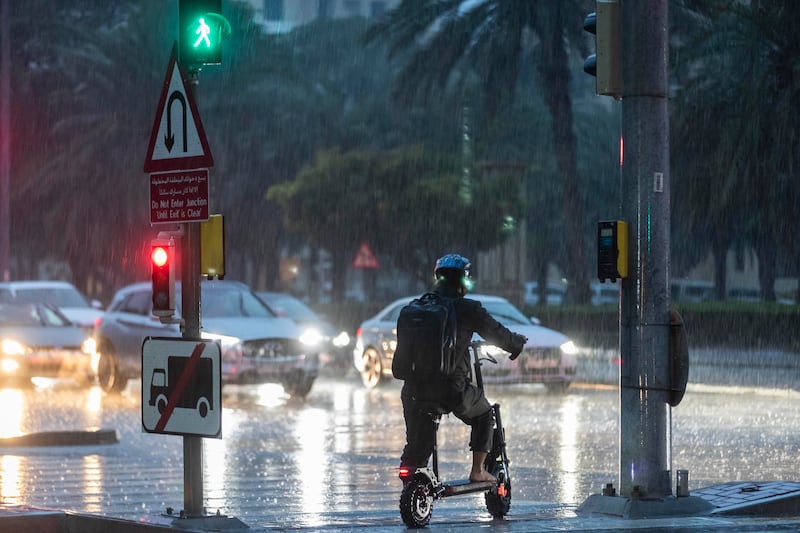

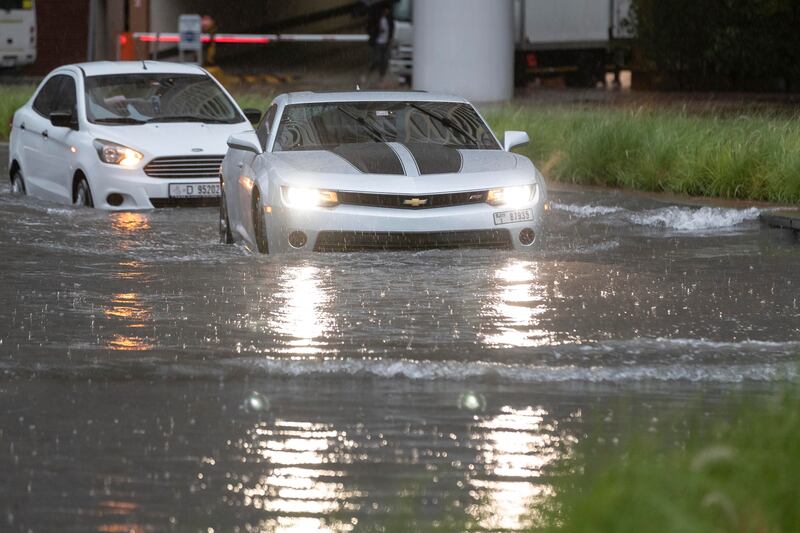
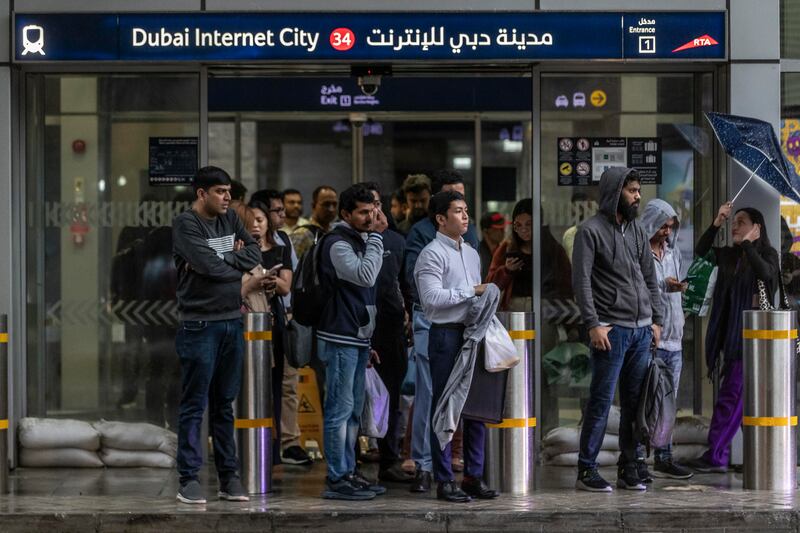
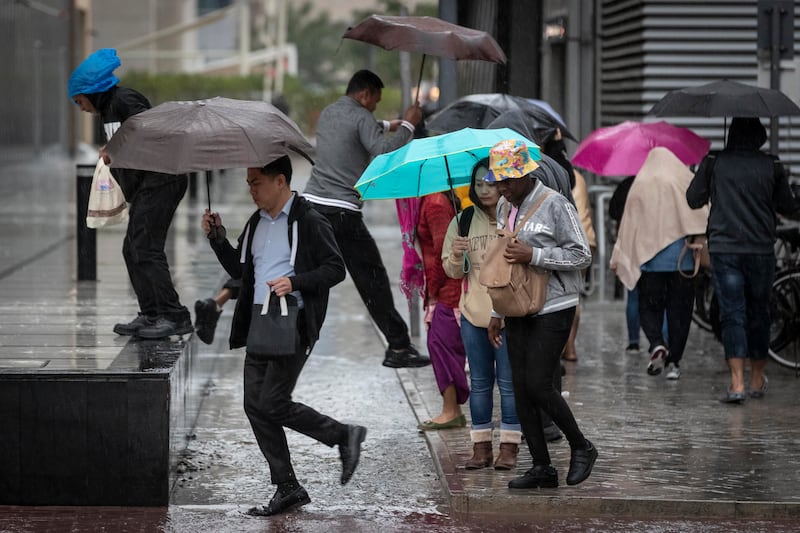



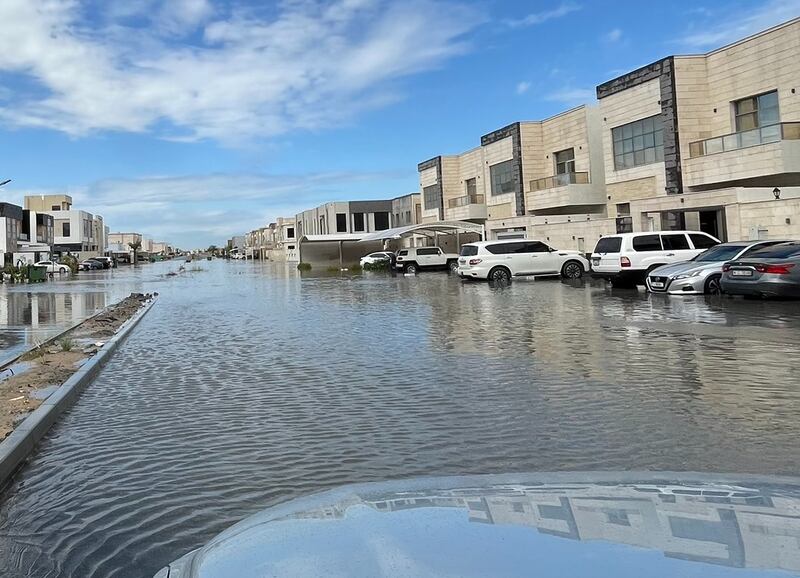
Safety alerts were issued as large parts of the UAE were hit by heavy rain, thunder and lightning overnight and into Monday morning. Antonie Robertson/The National
How to make claims
People affected by last week’s rains can claim damages under the natural calamity coverage of their motor insurance policies, according to Faisal Abbas, vice president of employee benefits and general insurance at the Continental Group.
There are standard and special exclusions in motor insurance policies. A typical exclusion would be if the policyholder consciously drives the vehicle to a flood-prone or waterlogged area, Mr Abbas says.
A customer is eligible to make claims under natural calamity and receive a payout only if their vehicle was parked or stationary at a designated place, he says.
What to do during floods
The most important point to remember in the event of a flooded car is to refrain from starting the engine, Mr Abbas says.
The first course of action is to call the insurance company immediately and understand the next steps to follow. That helps avoid any complexities that may arise in the claims process, he adds.
Immediately report the incident to the police and obtain a police report, after which you will be given a claim number. If towing services are needed, contact the insurance company’s 24/7 free roadside assistance hotline, according to Policybazaar.
Document the damage thoroughly by taking photographs or videos, serving as evidence for assessing the extent of damage accurately, Ms Chauhan says.
Documents required by the insurer include copies of the insurance policy, Emirates ID, Mulkiya and vehicle registration plate, she adds.
If you drive your car into flood waters, there could be engine failure and the repair is more time-consuming and expensive, says Kiran Viswam, managing partner of Dubai-based Best Line Garage.
If your car was parked and water enters it, the electronics could be jammed, but you may be able to recover the car at a smaller cost, Mr Viswam adds.
He says demand for repair work is picking up as some cars are still stranded.
“The turnaround time to repair each car is more than usual. The spare parts supply chain is under pressure because of the sudden spike in demand,” he says.
“We take up to three days to identify the problem and it may take up to one month if the parts are not available. So, the turnaround time on average could be two to three weeks.”
How to protect your car during floods
During floods, people must try to find a higher place to park their car, not drive during rains, try to work from home on days with rain prediction and take public transport if possible, Mr Viswam recommends.
If the authorities ask you to avoid driving, do not use the roads unless it’s absolutely necessary, Mr Nair from Gargash Insurance says.
Rise in car rentals
Meanwhile, Soham Shah, chief executive and founder of on-demand car subscription platform Selfdrive Mobility, says he has seen a 30 per cent spike in car rental reservations after the rains.
Demand is high for economy vehicles including the Nissan Sunny and Mitsubishi Attrage, and compact SUVs such as the Corolla Cross and Nissan X-Trail, he says.
There is high demand for two types of reservations: seven days and a month. Monthly reservations have seen a drastic upwards trend, he says.
“We have lowered prices. Our price starts from Dh999 for a month for models like Mitsubishi Attrage and Nissan Sunny, which is the entry level,” Mr Shah points out.
“The intention is to ease the pain that people have gone through by losing their mobility. Even if your car is damaged, you may still have continuing car loan instalments to pay.”
Spare parts shortage
Garages and spare part shops keep parts in stock that are commonly in demand. This typically includes windscreens, front and rear windows, head lamps and bonnets. But integral components for engines are not stocked in large numbers, he says.
For instance, for premium vehicles, the parts may have to be imported from Germany. For that, the customer has to pay first.
Mr Shah recommends customers take out zero depreciation or zero liability insurance, which means their liability as a vehicle owner is zero if such events occur. These are about 5 per cent to 15 per cent more expensive than comprehensive insurance policies, but they are “worth every penny”, he says.
“For instance, if the vehicle cost is Dh200,000 and it gets flooded. If the car gets written off by the insurance company and you have a zero depreciation insurance, the insurer will directly credit you with the full value of the car,” he says.
How to claim car insurance
- Immediately report the incident to the police and obtain a police report, as mandated in each emirate. You will be given a claim number.
- If towing services are needed, contact the insurance company’s 24/7 free roadside assistance hotline.
- Document the damage thoroughly by taking photographs or videos, serving as evidence for assessing the extent of damage accurately.
- Email and follow the intimation process set by each insurer.
- Documents required are copies of the insurance policy, Emirates ID, Mulkiya and vehicle registration plate.
Where to obtain a police report
- Dubai – www.dubaipolice.gov.ae
- Sharjah – www.shjpolice.gov.ae
- Abu Dhabi, Ras Al Khaimah, Al Ain, Fujairah, Umal Qwain – https://saaed360.saaed.ae
